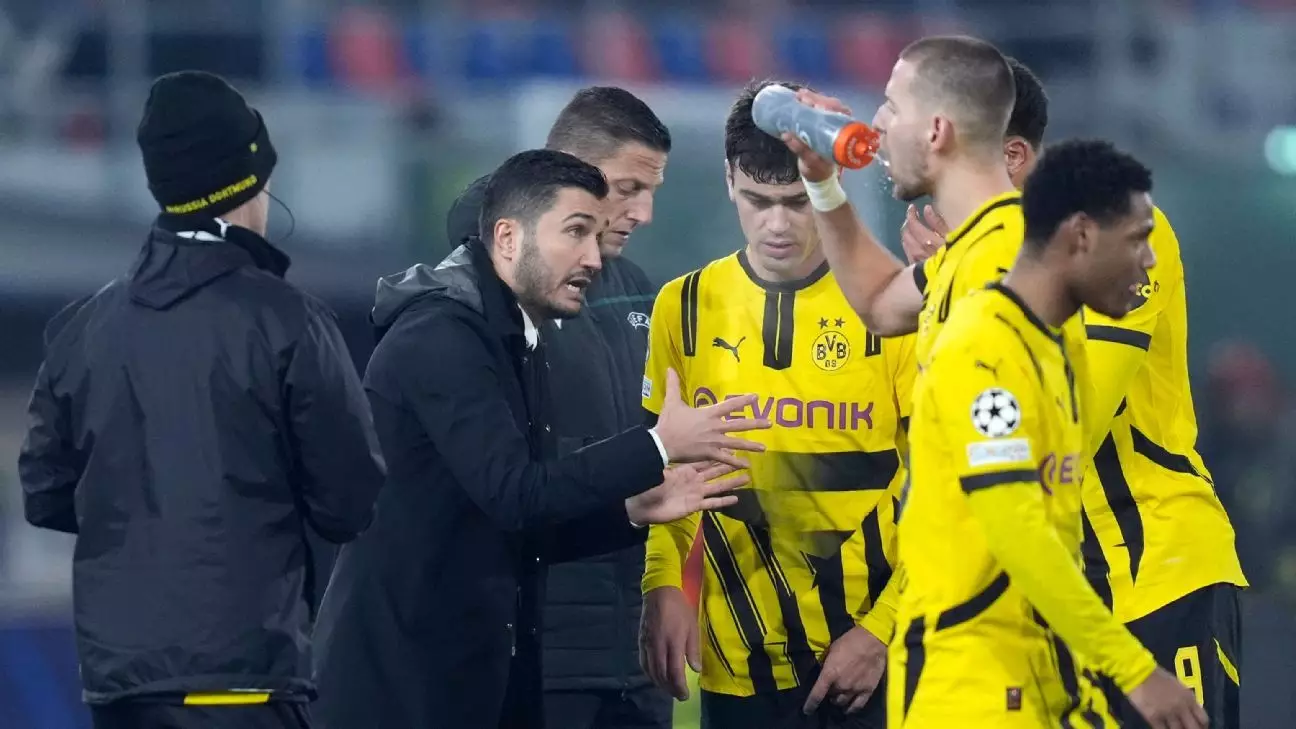Borussia Dortmund finds itself in a quagmire, grappling with a disheartening four-game losing streak across all competitions, culminating in a staggering 2-1 defeat to Bologna in the Champions League. This unexpected loss has sent shockwaves through the team, raising serious questions about the effectiveness of Nuri Sahin’s management. Once rising through the ranks as a promising footballer and former club ball boy, Sahin is now facing scrutiny over his ability to steer the team back to success as they hover precariously near the bottom of the league standings.
The gravity of the situation cannot be overstated. With every passing match, the stakes grow higher, pushing Sahin to confront uncomfortable realities about his position as coach. The ex-player’s candid admission regarding the possibility of his own dismissal reflects the chaotic winds swirling around the club. “If I am the problem, if a coach change would solve all problems, so be it,” Sahin stated, putting the team’s needs ahead of his personal career ambitions. This humility shows a level of personal accountability that is commendable yet indicative of a deeper crisis within the club.
Pressure in top-tier football is known to be relentless, and Sahin’s current predicament illustrates the acute demands placed on managers, particularly those in their inaugural seasons. Following a promising stint as an assistant coach, the transition to the head role has proven to be a much steeper hill to climb. Sahin’s nurturing of a previously-winning culture now seems fragmented as the team struggles to execute even the most fundamental of game plans. An initial lead against Bologna, showcasing a solid first-half performance, quickly devolved into a reminder of the team’s frail mental state when they allowed two goals in quick succession, sorrows compounded as this defeat lowered their position to 13th in their group.
The disarray leaves one to ponder whether it is solely coaching failures at play or if other factors, such as player morale and dynamics, play an equally critical role. Players often mirror their coach’s mentality; thus, Sahin’s bewilderment and feelings of distrust may be silently reflected on the pitch. How players interpret their coach’s trust can either uplift or undermine performance, and Sahin’s need for assurance amidst turmoil is a testament to the intricate balance required in leading a team.
The ramifications of Dortmund’s poor run extend beyond the pitch, pushing club executives like managing director Lars Ricken to assess their next steps critically. Their anticipated discussions following the match on Tuesday outline a pivotal moment for Borussia Dortmund’s future. Ricken’s assertion that the need for wins has become paramount underscores the instability that has crept into the club’s fabric. Declining to publicly guarantee Sahin’s position, he noted a productive working relationship with the coach yet balanced it with the sobering reality that results are non-negotiable in football.
This precarious situation has laid bare a classic dilemma within sports management: to stick with a coach and risk continued failure, or to initiate a change in leadership in hopes of a turnabout. The board’s decision ultimately matters as they grapple with these pressing questions while being mindful of how head coaches can impact the morale and cohesion of the team.
While it might be tempting to dwell on the despair permeating Dortmund’s current state, there lies the potential for rebirth. Nuri Sahin, despite his challenges, carries a rich history within the club that resonates with fans and players alike. His journey from the club’s youth ranks to the highest echelons of football embodies a narrative of perseverance that could inspire necessary changes. However, this extends far beyond mere sentiment; tangible results must accompany emotion, solidifying his intent to cultivate a winning atmosphere.
If Sahin is to remain at the helm, he must evolve and fortify his tactical approach to dismantle opposing defenses effectively. Improvement requires not just individual brilliance but a cohesive team effort, rooted in trust and resilience. Borussia Dortmund’s storied legacy is at stake, and time is slipping rapidly. Decisions made in the coming days, whether affecting the coaching staff or focusing on player performances, will dictate not just the immediate future but possibly the club’s direction for years to come.

